广州市七年级下册英语U5语法专练
广州市初中英语七年级下册Unit 5经典练习卷(含解析)

一、选择题1.—You look very ______. What’s wrong with you?—I’m feeling sick. Maybe I need to see the doctor.A.strong B.weak C.excited D.happy B解析:B【解析】句意:你看起来很虚弱。
怎么了?——我觉得不舒服,也许我需要去看医生。
A. strong强壮的;B. weak虚弱的;C. excited兴奋的;D. happy高兴的。
根据“-I'm feeling sick.”判断,身体虚弱,故答案为B。
2.—Is that _______ elephant?—Yes. And _______ elephant is 3 years old.A.a; the B.an; an C.a; an D.an; the D解析:D【解析】句意:——那是大象吗?——是的,那头大象3岁了。
考查冠词辨析题。
a和an都是不定冠词,表泛指;a用于辅音音素开头的单词前,an用于元音音素开头的单词前。
the是定冠词,表特指。
本题前一句elephant以元音音素开头,需用an;后一句elephant是指上文提到的事物,需用定冠词the修饰。
根据句意和语境,可知选D。
3.One of my friends ________ playing basketball.A.like B.likesC.want D.wants B解析:B【解析】句意:我的一个朋友喜欢打篮球。
like“喜欢”,常用like doing something,表示“喜欢做某事”;want“想要”,常用want to do something,表示“想要做某事”;One of加可数名词复数表示“…中的一个”,作主语时谓语动词用单数形式;根据句意,结合选项,故答案选B。
4.My father is very busy. He only ________ six hours a night.A.looks B.walksC.sleeps D.eats C解析:C【解析】句意:我爸爸很忙,他每晚只睡六个小时。
七年级英语U5+have+和has语法练习 (1)

U5 have 和has语法练习一.用have 和has填空1.I ____ a cat.2.He ____ a dog.3.She ____ long hair.4.We ____ a big house(房子).5.They ____ a happy family(家庭).6.It ____ a short tail(尾巴).7.You ____ a good teacher.8.Jane ____ two big eyes.9.Tom ____ a red pen.10.My mother ____ a beautiful nose11. I______ a nice puppet.12. He______a good friend.13. They______some masks.14. We________some flowers.15. She_________a duck.16. My father________a new bike. 17. Her mother_______a vase.18. Our teacher_______ an English book.19. Our teachers_______a basketball.20. Their parents(父母)______some books21. Nancy_________many skirts.22. David__________some jackets.23. My friends__________a football.24. What do you__________?25. What does Mike__________?26. What do your friends___________?27. What does Helen___________?28. His brother________a basketball.29. Her sister_________a nice doll.30. Miss Li__________an English book.二.填写正确的否定形式(don’t/doesn’t)1.I ____ have a cat.2.He ______ like dogs.3.She ____ have a long hair.4.We ____ have a big house.5.They ____ have a happy family.6.It ____ have a short tail.7.You ____ like a good teacher.8.Elva ____ like a bad girl.9.Tom ____ have a red pen.10.My mother ____ have a beautiful nose.11.Cats ____ have two legs.12.Dogs ____ have one ears.13.My father ____ have a blue car.14.Everybody ____ have two hands.15.I ____ like a model plane.16.Lily ____ like a toy.三.按要求改写下列句子。
广州新版七年级英语下册Unit5(含答案)
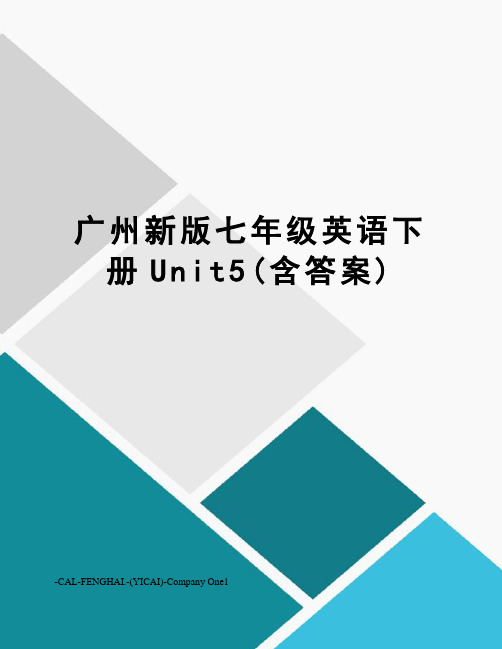
广州新版七年级英语下册U n i t5(含答案)-CAL-FENGHAI.-(YICAI)-Company One1Unit 5单元综合检测题Class Name Marks听力部分(15分)第一节听力理解(共10小题;每小题1分,满分10分)听下面各段对话或独白,根据各段播放内容及相关小题,从题中所给的A、B、C项中,选出最佳选项。
听下面一段对话,回答第1-2小题。
( )1.What’s “Symi”A. It’s a way t o turn salt water into fresh water.B. It’s a kind of factory.C. It’s a place to heat sea water.( )2. If there isn’t enough sunshine, what way may people use to get fresh water?A. Build a Symi factory.B. Heat sea water.C. Buy some fresh water.听下面一段对话,回答第3-4小题。
( )3. What did the woman do last weekend?A. She wrote an article.B. She called the TV station.C. She went to a paper factory.( )4.What are the speakers going to do?A. They are going to call the paper factory.B. They are going to write an article for the newspaperC. They are going to the factory to stop it from pouring waste water into the river.听下面一段对话,回答第5-7小题( )5. What is the talk mainly about?A. The Pearl River’s beauty.B. The Pearl River’s future.C. Protecting the Pearl River.( )6. What did the government do with those factories pouring dirty water?A. Make them closed.B. Ask them to pay the fine(罚款)C. Let them work on.( )7. What can we learn from the talk?A. The Pearl River is as dirty as before.B. People in Guangzhou never drink water from the Pearl River.C. The Pearl River becomes cleaner and cleaner.听下面一段独白,回答第8-10小题。
Unit5语法专项练习题人教版七年级英语下册
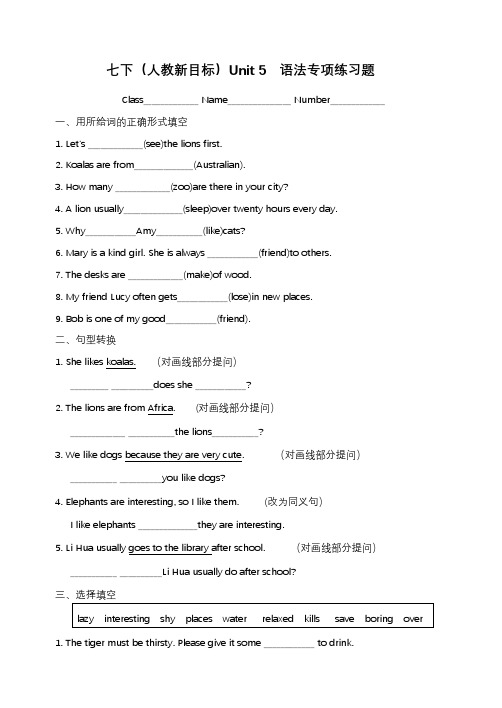
七下(人教新目标)Unit 5 语法专项练习题Class_____________ Name_______________ Number_____________一、用所给词的正确形式填空1.Let’s _____________(see)the lions first.2.Koalas are from______________(Australian).3.How many _____________(zoo)are there in your city?4.A lion usually______________(sleep)over twenty hours every day.5.Why____________Amy___________(like)cats?6.Mary is a kind girl. She is always ____________(friend)to others.7.The desks are _____________(make)of wood.8.My friend Lucy often gets____________(lose)in new places.9.Bob is one of my good____________(friend).二、句型转换1.She likes koalas. (对画线部分提问)_________ __________does she ____________?2.The lions are from Africa. (对画线部分提问)_____________ ___________the lions___________?3.We like dogs because they are very cute. (对画线部分提问)___________ __________you like dogs?4.Elephants are interesting, so I like them. (改为同义句)I like elephants ______________they are interesting.5.Li Hua usually goes to the library after school. (对画线部分提问)___________ __________Li Hua usually do after school?1.The tiger must be thirsty. Please give it some ____________ to drink.2.I feel_____________when I am lying on the beach.3.Jim is kind of _____________. He is afraid of strangers.4.He often ____________cows for beef.5.I can remember the _____________with beautiful animals.6.There are ___________sixty students in my class.7.Let’s ____________these wild animals.8.He’s too______________. He often goes to school late.9.The story is _____________. I don’t like it.10.I like cats because they are very ____________.1.---____________do you get to school?---I usually get to school at 7:30 am.2.---____________do you live?---I live in a small town near Beijing.3.---____________old is your brother?---He is 11 years old.4.---___________is the boy late for school?---Because his bike is broken.5.---______________is your favorite subject?---English.Dogs are very good pets. They are very friendly to people and very beautiful. Most dogs get on well with 1 and their parents. Some are good guard dogs because theycry loudly when a strange person 2 .When you buy a dog, an important thing to think about is its 3 ---buy a small dog if your home is small and a 4 one if yours is larger. Many people don’t know 5 to feed to their dogs. Dogs eat almost anything! They like meat, rice and lots of 6 things. You can buy lots of food which is made for dogs in shops. Don’t let your dog eat too much. Always leave some 7 water for our dog. It can 8 thirsty very quickly, especially in summer.Remember that dogs need 9 .You should take it for a walk every day. Don’t keep your dog 10 all day.1._____________2.____________3.____________4.______________5._____________6.____________7.______________8._____________9.____________10._____________。
初中英语人教新目标七年级下册Unit5 语法练习(why 引导的特殊疑问)(附参考答案)
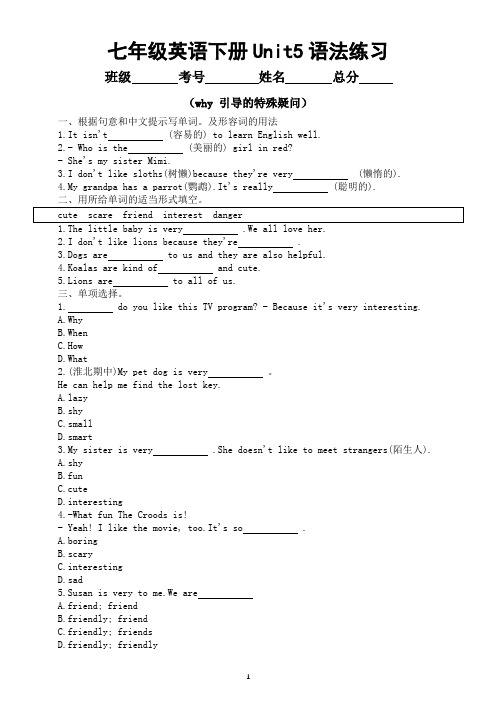
七年级英语下册Unit5语法练习班级考号姓名总分(why 引导的特殊疑问)一、根据句意和中文提示写单词。
及形容词的用法1.It isn't (容易的) to learn English well.2.- Who is the (美丽的) girl in red?- She's my sister Mimi.3.I don't like sloths(树懒)because they're very (懒惰的).4.My grandpa has a parrot(鹦鹉).It's really (聪明的).1.The little baby is very .We all love her.2.I don't like lions because they're .3.Dogs are to us and they are also helpful.4.Koalas are kind of and cute.5.Lions are to all of us.三、单项选择。
1. do you like this TV program? - Because it's very interesting.A.WhyB.WhenC.HowD.What2.(淮北期中)My pet dog is very 。
He can help me find the lost key.zyB.shyC.smallD.smart3.My sister is very .She doesn't like to meet strangers(陌生人).A.shyB.funC.cuteD.interesting4.-What fun The Croods is!- Yeah! I like the movie, too.It's so .A.boringB.scaryC.interestingD.sad5.Susan is very to me.We areA.friend; friendB.friendly; friendC.friendly; friendsD.friendly; friendly四、根据所给汉语提示完成句子,每空一词。
新目标七年级英语下Unit_5重点短语句型语法 配套试题(答案)范文

七年级下Unit 5 I’m watching TV.Ⅰ、Useful expressions:1. watch TV 看电视2. talk on the phone 在电话上聊天3. TV show 电视节目4. write a letter 写封信5. read a book/books 读书;看书6. wait for 等候;等待7. talk about sth./sb. 谈论某事(物)/某人8. some of … ……中的一些;一些……9. in the first/second/next/last photo在第一张/第二张/下一张/最后一张照片里10. at the pool在这个(那个)水池11. at home 在家12. be with sb. 和某人在一起13. in this photo 在这张相片里Ⅱ、Sentences:1.What are you doing? 你在过什么?I’m watching TV. 我正在看电视。
1.What’s he doing? 他在干嘛?He’s reading. 他正在阅读。
2.That sounds good. 那听起来不错。
3.What’s he taking? 他正在拿什么?4.What’s he waiting for? 他在等什么?5.What’s he reading? 他在读什么?6.Who are Ben and Tim talking to? 本和蒂姆在和谁说话?7.What are they talking about? 他们正谈论什么?8.Where are they all going? 他们将要去哪儿?9.Where is he swimming? 他正在哪儿游泳?10.Is Tina there? 蒂娜在那儿吗?No, she isn’t. 不,她没在。
11.Here are some … 这儿有一些……12.Are you surfing? 你在冲浪吗?No, I’m not. 不,我没有。
广州牛津版七年级下语法专项训练
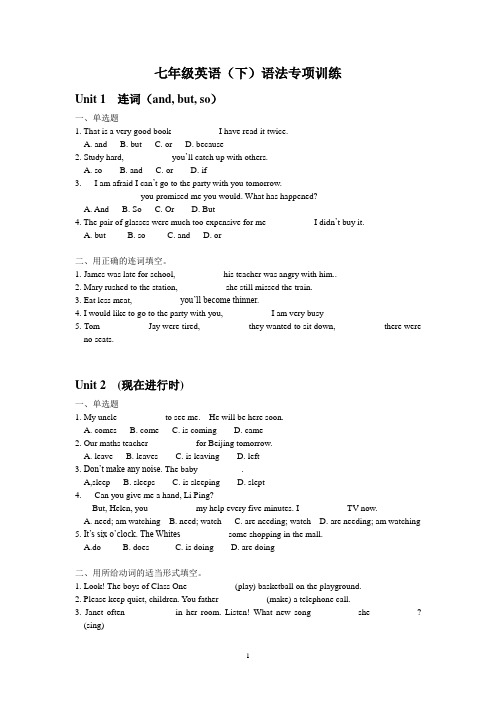
七年级英语(下)语法专项训练Unit 1 连词(and, but, so)一、单选题1. That is a very good book __________ I have read it twice.A. andB. butC. orD. because2. Study hard, __________ you’ll catch up with others.A. soB. andC. orD. if3. --- I am afraid I can’t go to the party with you tomorrow.--- __________ you promised me you would. What has happened?A. AndB. SoC. OrD. But4. The pair of glasses were much too expensive for me __________ I didn’t buy it.A. butB. soC. andD. or二、用正确的连词填空。
1. James was late for school, __________ his teacher was angry with him..2. Mary rushed to the station, __________ she still missed the train.3. Eat less meat, __________ you’ll become thinner.4. I would like to go to the party with you, __________ I am very busy5. Tom __________ Jay were tired, __________ they wanted to sit down, __________ there were no seats.Unit 2 (现在进行时)一、单选题1. My uncle __________ to see me. He will be here soon.A. comesB. comeC. is comingD. came2. Our maths teacher __________ for Beijing tomorrow.A. leaveB. leavesC. is leavingD. left3. Don’t make any noise. The baby__________.A,sleep B. sleeps C. is sleeping D. slept4. --- Can you give me a hand, Li Ping?---But, Helen, you __________ my help every five minutes. I __________ TV now.A. need; am watchingB. need; watchC. are needing; watchD. are needing; am watching5. It’s six o’clock. The Whites __________ some shopping in the mall.A.doB. doesC. is doingD. are doing二、用所给动词的适当形式填空。
最新广州英语七年级下U5-U8练习题
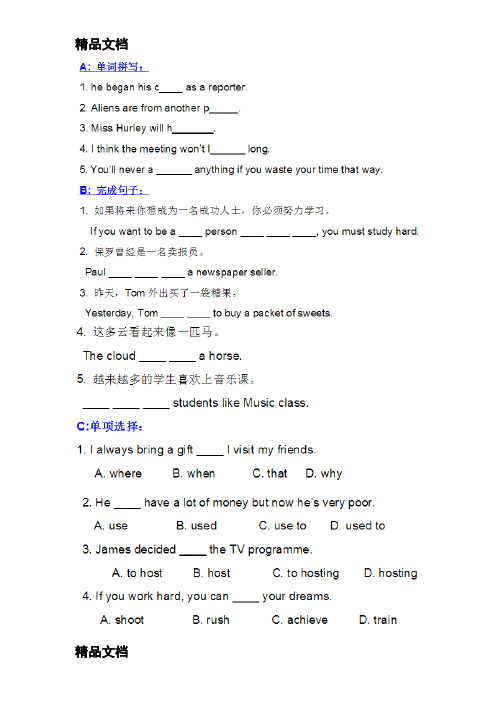
新材料手工艺品。目前,国际上传统的金银、仿金银制成饰品的销售在逐步下降,与此形成鲜明对比的是,数年以前兴起的崇尚然风格、追求个性的自制饰品--即根据自己的创意将各种材质的饰珠,用皮、布、金属等线材串出的品,正在各国的女性中大行其道。U5-U8
大学生的消费是多种多样,丰富多彩的。除食品外,很大一部分开支都用于。服饰,娱乐,小饰品等。女生都比较偏爱小饰品之类的消费。女生天性爱美,对小饰品爱不释手,因为饰品所展现的魅力,女人因饰品而妩媚动人,亮丽。据美国商务部调查资料显示女人占据消费市场最大分额,随社会越发展,物质越丰富,女性的时尚美丽消费也越来越激烈。因此也为饰品业创造了无限的商机。据调查统计,有50%的同学曾经购买过DIY饰品,有90%的同学表示若在学校附近开设一家DIY手工艺制品,会去光顾。我们认为:我校区的女生就占了80%。相信开饰品店也是个不错的创业方针。
虽然调查显示我们的创意计划有很大的发展空间,但是各种如“漂亮女生”和“碧芝”等连锁饰品店在不久的将来将对我们的创意小屋会产生很大的威胁。
精明的商家不失时机地打出“自己的饰品自己做”、“DIY(Do It Yourself)饰品、真我个性”的广告,推出“自制饰品”服务,吸引了不少喜欢标新立异、走在潮流前端的年轻女孩,成为上海的时尚消费市场。其市场现状特点具体表现为:
1、你一个月的零用钱ቤተ መጻሕፍቲ ባይዱ约是多少?
大学生对手工艺制作兴趣的调研
标题:大学生“负债消费“成潮流2004年3月18日
民族性手工艺品。在饰品店里,墙上挂满了各式各样的小饰品,有最普通的玉制项链、珍珠手链,也有特别一点如景泰蓝的手机挂坠、中国结的耳坠,甚至还有具有浓郁的异域风情的藏族饰品。
我们大学生没有固定的经济来源,但我们也不乏缺少潮流时尚的理念,没有哪个女生是不喜欢琳琅满目的小饰品,珠光宝气、穿金戴银便是时尚的时代早已被推出轨道,简洁、个性化的饰品成为现代时尚女性的钟爱。因此饰品这一行总是吸引很多投资者的目光。然而我们女生更注重的是感性消费,我们的消费欲望往往建立在潮流、时尚和产品的新颖性上,所以要想在饰品行业有立足之地,又尚未具备雄厚的资金条件的话,就有必要与传统首饰区别开来,自制饰品就是近一两年来沿海城市最新流行的一种。
广州英语 7下语法综合练习

语法专练Unit 1 现在进行时一、按要求改写句子。
1.The boy is playing basketball.否定句:________ 一般疑问句:________肯定回答:________ 否定回答:________对“the boy”提问:________2.改写句子。
(1)she,the window,open,now.(用现在进行时连词成句)____________________________________________________________________ (2)is,who,the window,clean? (用现在进行时连词成句)____________________________________________________________________ (3)She is closing the door now.(用they替换she)____________________________________________________________________ (4)Look! Lily is dancing.(改为一般疑问句)____________________________________________________________________ (5)Kate is looking for her watch.(改为否定句)____________________________________________________________________ (6)Mrs. White is watching TV.(对画线部分提问)____________________________________________________________________ (7)I am doing homework.(对画线部分提问)____________________________________________________________________ (8)They are waiting for you at the library.(对画线部分提问)____________________________________________________________________二、用括号中动词的适当形式填空。
(人教新目标)广州市初中英语七年级下册Unit 5测试卷(含答案解析)
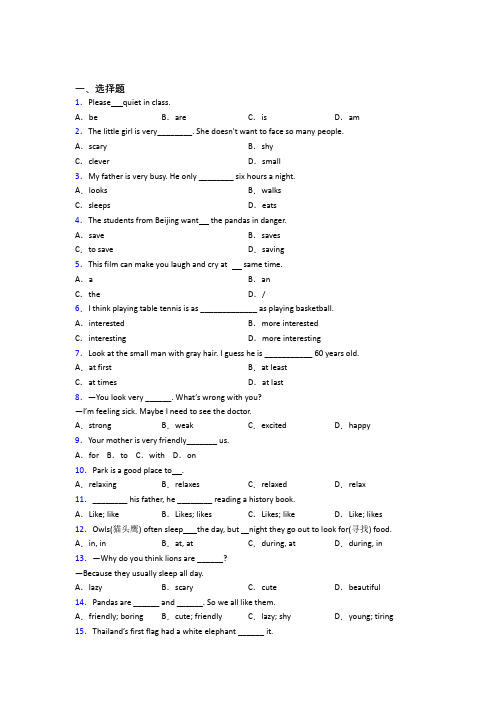
一、选择题1.Please quiet in class.A.be B.are C.is D.am 2.The little girl is very________. She doesn't want to face so many people.A.scary B.shyC.clever D.small3.My father is very busy. He only ________ six hours a night.A.looks B.walksC.sleeps D.eats4.The students from Beijing want the pandas in danger.A.save B.savesC.to save D.saving5.This film can make you laugh and cry at same time.A.a B.anC.the D./6.I think playing table tennis is as _____________ as playing basketball. A.interested B.more interestedC.interesting D.more interesting7.Look at the small man with gray hair. I guess he is ___________ 60 years old.A.at first B.at leastC.at times D.at last8.—You look very ______. What’s wrong with you?—I’m feeling sick. Maybe I need to see the doctor.A.strong B.weak C.excited D.happy 9.Your mother is very friendly_______ us.A.for B.to C.with D.on10.Park is a good place to .A.relaxing B.relaxes C.relaxed D.relax 11.________ his father, he ________ reading a history book.A.Like; like B.Likes; likes C.Likes; like D.Like; likes 12.Owls(猫头鹰) often sleep the day, but night they go out to look for(寻找) food. A.in, in B.at, at C.during, at D.during, in 13.—Why do you think lions are ______?—Because they usually sleep all day.A.lazy B.scary C.cute D.beautiful 14.Pandas are ______ and ______. So we all like them.A.friendly; boring B.cute; friendly C.lazy; shy D.young; tiring 15.Thailand’s first flag had a white elephant ______ it.A.in B.on C.to D.at16.—Do you like tigers?—No. I think they're ________ scary.A.kinds of B.a kind of C.a kind D.kind of17.Molly plays ________ her friends a day.A.for B.with C.on D.up18.Look! Lily and Lucy ________ photos.A.are take B.is taking C.are taking D.taking19.Bob is younger than ________ in his class.A.any student B.other student C.any students D.any other student 20.Pandas are cute, they’re kind of shy.A.or B.and C.but D.then【参考答案】***试卷处理标记,请不要删除一、选择题1.A解析:A【解析】句意:在课上请安静。
广州市七年级下册英语U5-语法专练汇编

七年级下册英语U5 语法专练姓名____________________一、疑问代词who 和whosewho与whose都是疑问代词,一般放在句首,用来构成特殊疑问句。
1、who的意思是“谁”,在句子中做主语,相当于名词、人称代词主格。
后面不加名词。
如:—Who is he ?—He is John .他是谁?他是约翰。
—Who teaches your English?—Miss Liu.谁教你英语?刘老师。
当用who提问,不知道是谁和人的数量时,问句的谓语动词常用单数。
如:Who isn't at school today?今天谁没到校?2、whose的意思是“谁的”,可以单独使用,也可以和名词一起用,充当表语,定语等,相当于形容词。
1)提问部分作定语时,用“Whose +名词+一般疑问句?”结构。
如:Whose shirt is it?→It's my shirt.这是谁的衬衫?→这是我的衬衫。
2)提问部分作表语时,用“Whose +一般疑问句?”结构。
如:Whose is the shirt?→The shirt is mine.这件衬衫是谁的?→这件衬衫是我的。
单项选择1、_______ is the boy talking with your mother? He is Bob.A. WhoB. WhoseC. WhichD. What2、_______is the MP4 on my desk?A. WhoB. WhoseC. WhichD. What3、_______friend is Lo? Tom’s.A. WhoseB. WhoC. WhatD. When4、_______ is Lo’s mother? Mrs. Smith.A. WhoseB. WhoC. WhatD. When5、_______is Tom? He’s David’s father.A. WhoB. WhoseC. WhichD. What6、_______ daughter is Ann? She is Kelly’s daughter.A. WhoB. WhoseC. WhichD. What二、物主代词1、概述表示所有关系的代词叫做物主代词(Possessive Pronouns),也叫人称代词的所有格。
广州市七年级下册英语U5-语法专练

七年级下册英语U5 语法专练姓名____________________一、疑问代词who 和whosewho与whose都是疑问代词,一般放在句首,用来构成特殊疑问句。
1、who的意思是“谁”,在句子中做主语,相当于名词、人称代词主格。
后面不加名词。
如:—Who is he ?—He is John .他是谁?他是约翰。
—Who teaches your English?—Miss Liu.谁教你英语?刘老师。
当用who提问,不知道是谁和人的数量时,问句的谓语动词常用单数。
如:Who isn't at school today?今天谁没到校?2、whose的意思是“谁的”,可以单独使用,也可以和名词一起用,充当表语,定语等,相当于形容词。
1)提问部分作定语时,用“Whose +名词+一般疑问句?”结构。
如:Whose shirt is it?→It's my shirt.这是谁的衬衫?→这是我的衬衫。
2)提问部分作表语时,用“Whose +一般疑问句?”结构。
如:Whose is the shirt?→The shirt is mine.这件衬衫是谁的?→这件衬衫是我的。
单项选择1、_______ is the boy talking with your mother? He is Bob.A. WhoB. WhoseC. WhichD. What2、_______is the MP4 on my desk?A. WhoB. WhoseC. WhichD. What3、_______friend is Lo? Tom’s.A. WhoseB. WhoC. WhatD. When4、_______ is Lo’s mother? Mrs. Smith.A. WhoseB. WhoC. WhatD. When5、_______is Tom? He’s David’s father.A. WhoB. WhoseC. WhichD. What6、_______ daughter is Ann? She is Kelly’s daughter.A. WhoB. WhoseC. WhichD. What二、物主代词1、概述表示所有关系的代词叫做物主代词(Possessive Pronouns),也叫人称代词的所有格。
2020人教新目标七年级下册英语unit 5 语法50题 (word有答案)
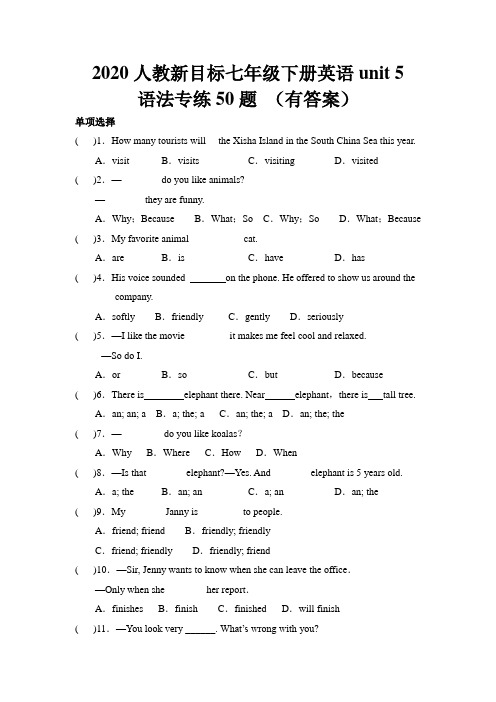
2020人教新目标七年级下册英语unit 5 语法专练50题(有答案)单项选择( )1.How many tourists will__ the Xisha Island in the South China Sea this year.A.visit B.visits C.visiting D.visited( )2.—________do you like animals?—________they are funny.A.Why;Because B.What;So C.Why;So D.What;Because ( )3.My favorite animal __________ cat.A.are B.is C.have D.has( )4.His voice sounded on the phone. He offered to show us around the company.A.softly B.friendly C.gently D.seriously( )5.—I like the movie ________ it makes me feel cool and relaxed.—So do I.A.or B.so C.but D.because( )6.There is elephant there. Near elephant,there is tall tree.A.an; an; a B.a; the; a C.an; the; a D.an; the; the( )7.—________ do you like koalas?A.Why B.Where C.How D.When( )8.—Is that _______ elephant?—Yes. And _______ elephant is 5 years old.A.a; the B.an; an C.a; an D.an; the( )9.My _______ Janny is ________ to people.A.friend; friend B.friendly; friendlyC.friend; friendly D.friendly; friend( )10.—Sir, Jenny wants to know when she can leave the office.—Only when she ______ her report.A.finishes B.finish C.finished D.will finish( )11.—You look very ______. What’s wrong with you?—I’m feeling sick.A.strong B.weak C.excited D.happy( )12.—Is ______ ready for the trip?—No, we still need to buy a map before we start the tripA.anything B.something C.everything D.nothing( )13.There are many ___animals in the zoo. And some animals are ___scary.A.kind of; kind of B.kinds of; kind ofC.kind of; kinds of D.kinds of; kinds of( )14.—do you like cats?—they are friendly and very smart.A.Why;So B.What;So C.Why;Because D.What;Because ( )15.—do people kill elephants?—They kill elephants their ivory.A.What; on B.What; for C.Why; on D.Why; for ( )16.I’m hungry now I didn’t have breakfast this morning.A.because B.because of C.and D.but( )17.Maria wears a blue T-shirt and looks cool today.A.kind of B.a kind of C.all kinds of D.kinds of ( )18.Don't forget ________ the door when you go out,Jane.A.opening B.to open C.closing D.to close( )19.—I'm sorry, Mr Hu. I ________ my homework at home.—It doesn't matter. Please remember ________ it here this afternoon.A.forgot; to bring B.left; to take C.forgot; to take D.left; to bring ( )20.There is _____ elephant in the zoo. _____ elephant comes from Africa.A.an; An B.the; The C.a ; The D.an; The( )21.This is__________ panda and__________ panda is cute.A.a;the B.an;theC.an;an D.the;the( )22.Grace is a __________ girl.She hates meeting new frie nds.A.tidy B.shyC.strict D.friendly( )23.Tony is very busy.He only __________ six hours a night.A.looks B.walksC.sleeps D.eats( )24.Let's go to the __________ next.There are many animals.A.school B.zooC.room D.home( )25.—My pet dog can walk __________ two legs.What about __________?—My pet dog can`n do it.A.in;your B.in;yoursC.on;your D.on;yours( )26.—Why __________ you like English?—Because it's too__________ and boring.A.do;difficult B.do;easyC.don't;difficult D.don't;easy( )27.—__________ are koalas from?—They are from Australia.A.Why B.WhatC.Where D.When( )28.Dogs are__________ interesting but tigers are really scary.A.one kind of B.kind ofC.kind D.all kinds of( )29.Many people like pandas __________ they are cute.A.though B.ifC.while D.because( )30.—Let's go to the park after school.—__________A.It's boring. B.Sounds well.C.OK. D.What about you?( )31.—does Mike like the TV program The Animal World? —Because he is an animal lover.A.WhatB.HowC.WhyD.When( )32.Dear friends,to save elephants,please tell people around you not to buy things of ivory.A.makingB.makeC.madeD.to make( )33.—Why don`t you take a map with you?—I know the way there well,so I won’t.A.get drunkB.get cleanedC.get dressedD.get lost( )34.Tigers are dangerous animals,but now they are.A.in dangerB.out of dangerC.at dangerD.on danger( )35.—Let’s see the pandas in the zoo this weekend!—.A.That’s rightB.Good luckC.Thank youD.That sounds interesting( )36.—My pet cat can walk two legs. What about yours?—My pet cat can do it,too.A.inB.atC.onD.with( )37.the show is very interesting,I like it very much.A.Because;soB.So;becauseC.Because;/D.So;/( )38.Koalas are interesting,but lions are really scary.A.of kindB.kind ofC.kinds ofD.a kind of( )39.Mary is a girl.She doesn’t like to talk to others and has only a small number of friends.A.shyB.healthyzyD.quick( )40.Don’t forget thanks when other people help you in trouble.A.speakB.to speakC.sayD.to say( )41.—Does Bob keep a pet?—.He likes it.A.Yes,he isB.Yes,he doesC.No,he doesn’tD.No,he isn’t( )42.These cats are very to us. We all like them.A.friendlyB.beautifulC.cuteD.boring( )43.There is elephant and tiger in the new zoo.A.a;aB.an;aC.an;theD.an;an( )44.Don’t this tre e.It’s important to us.A.think ofB.look forC.talk toD.cut down( )45.Red is the color loved by most Chinese people because it is the of good luck.A.symbolB.numberD.picture( )46.My pet dog can walk ________ two legs.A onB withC inD at( )47.Lucy ___________ from South Africa.A isB areC haveD has( )48.In our library, we can ___________ many kinds of books.A watchB seeC lookD reads( )49----- _________ a koala ________ during the day?------ Yes, it does。
英语七年级下册Unit 5-Grammar Focus课件练习题及答案

night
英 语 七年级下册
配RJ版
第五元 Grammar Focus
( A )10.—Do you know that there are many____________ animals in the zoo?
—Yes, I do.And I also know that some of them are_______
英 语 七年级下册
配RJ版
第五元 Grammar Focus
三、because和so的用法和区别 1.不能将because( 因为)与so( 所以)同时用于一句话中。 2.because意为“因为”,后面说明原因;so意为“因此;所 以”,承上启下,表示顺接。 Eg.I was late because I missed the first bus.我迟到是因为 我错过了第一班公共汽车。 =I missed the first bus so I was late.我错过了首班公共汽 车,所以我迟到了。
配RJ版
第五元 Grammar Focus
( A )7.—Why do you like penguins( 企鹅)?
—Because they are very
.
A.cute
B.dirty
zy
D.tall
( B )8.—Do you like
?
—Yes, they’re very smart.
英 语 七年级下册
配RJ版
第五元 Grammar Focus
一、单项选择
( D )1.—Tony,
are you in such a hurry?
—The meeting will start soon.I don’t want to be late.
人教版初中英语七年级下册Unit5语法指导与练习
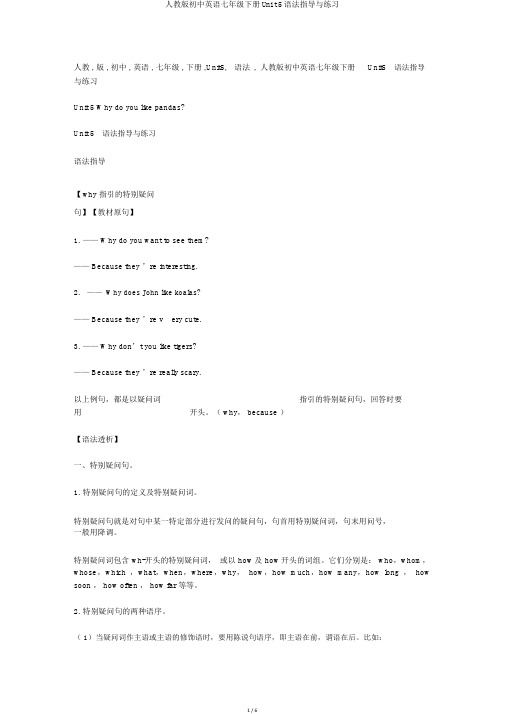
人教 , 版 , 初中 , 英语 , 七年级 , 下册 ,Unit5,语法,人教版初中英语七年级下册Unit5语法指导与练习Unit 5 Why do you like pandas?Unit 5语法指导与练习语法指导【why 指引的特别疑问句】【教材原句】1. —— Why do you want to see them?—— Because they ’re interesting.2.——Why does John like koalas?—— Because they ’re v ery cute.3. —— Why don’t you like tigers?—— Because they ’re really scary.以上例句,都是以疑问词指引的特别疑问句,回答时要用开头。
( why, because )【语法透析】一、特别疑问句。
1.特别疑问句的定义及特别疑问词。
特别疑问句就是对句中某一特定部分进行发问的疑问句,句首用特别疑问词,句末用问号,一般用降调。
特别疑问词包含 wh-开头的特别疑问词,或以 how及 how开头的词组。
它们分别是: who,whom,whose,which ,what,when,where,why,how,how much,how many,how long ,how soon , how often , how far 等等。
2.特别疑问句的两种语序。
( 1)当疑问词作主语或主语的修饰语时,要用陈说句语序,即主语在前,谓语在后。
比如:Who is waiting for you?谁在等你?(2)当疑问词不作主语时,要用疑问语序,即:疑问词 +一般疑问句语序?比如: What animals do you like? 你喜爱什么动物? Where is the panda from?大熊猫来自哪里?二、疑问副词why 指引的特别疑问句。
是疑问副词,意为“为何”。
2024七年级英语下册专项训练五语法运用课件新版外研版

一
二
三
13. My father put on his coat and went (go) away in a hurry. 点拨:句意:我父亲穿上外套匆忙走了。根据put on可知时
态是一般过去时,要用go的过去式went。
14. There was (be) an English party in the school last night. 15. Some travelers built (build) a small house near the sea
Stadium.
一
二
三
4. —What did he see (see) last night? —He saw (see) a funny movie.
5. Tim wasn’t (be not) a doctor three years ago.
一
二
三
6. Amy’s schoolbag is brown. What about yours (you)? 点拨:此处表示“你的书包”,空格后没有名词,因此用名
C. may
D. shouldn’t
一
二
三
( C )13. Please A. isn’t C. don’t be
late for school. B. aren’t D. not be
一
二
三
( C )14. —Joe,
do you clean your house?
—Three times a week.
一
二
三
( A )12. —I went to Mount Wudang with my four friends in
- 1、下载文档前请自行甄别文档内容的完整性,平台不提供额外的编辑、内容补充、找答案等附加服务。
- 2、"仅部分预览"的文档,不可在线预览部分如存在完整性等问题,可反馈申请退款(可完整预览的文档不适用该条件!)。
- 3、如文档侵犯您的权益,请联系客服反馈,我们会尽快为您处理(人工客服工作时间:9:00-18:30)。
七年级下册英语U5 语法专练
姓名____________________
一、疑问代词who 和whose
who与whose都是疑问代词,一般放在句首,用来构成特殊疑问句。
1、who的意思是“谁”,在句子中做主语,相当于名词、人称代词主格。
后面不加名词。
如:—Who is he ?—He is John .
他是谁?他是约翰。
—Who teaches your English?—Miss Liu.
谁教你英语?刘老师。
当用who提问,不知道是谁和人的数量时,问句的谓语动词常用单数。
如:
Who isn't at school today?
今天谁没到校?
2、whose的意思是“谁的”,可以单独使用,也可以和名词一起用,充当表语,定语等,相当于形容词。
1)提问部分作定语时,用“Whose +名词+一般疑问句?”结构。
如:
Whose shirt is it?→It's my shirt.
这是谁的衬衫?→这是我的衬衫。
2)提问部分作表语时,用“Whose +一般疑问句?”结构。
如:
Whose is the shirt?→The shirt is mine.
这件衬衫是谁的?→这件衬衫是我的。
单项选择
1、_______ is the boy talking with your mother? He is Bob.
A. Who
B. Whose
C. Which
D. What
2、_______is the MP4 on my desk?
A. Who
B. Whose
C. Which
D. What
3、_______friend is Lo? Tom’s.
A. Whose
B. Who
C. What
D. When
4、_______ is Lo’s mother? Mrs. Smith.
A. Whose
B. Who
C. What
D. When
5、_______is Tom? He’s David’s father.
A. Who
B. Whose
C. Which
D. What
6、_______ daughter is Ann? She is Kelly’s daughter.
A. Who
B. Whose
C. Which
D. What
二、物主代词
1、概述
表示所有关系的代词叫做物主代词(Possessive Pronouns),也叫人称代词的所有格。
物主代词分为形容词性物主代词和名词性物主代词两种。
物主代词有人称和数的变化。
We love our motherland. 我们热爱我们的祖国。
2)名词性物主代词在句子中与名词相似,起名词的作用,可单独使用。
相当于“形容词性物主代词+名词”
Look at the two pencils. The red one is yours and the blue one is mine.
看那两支铅笔,红的是你的,蓝的是我的。
He likes my pen. He doesn’t like hers.
他喜欢我的钢笔。
不喜欢她的。
There is a book. It's hers.
这有本书。
是她的(书)。
(这里的hers=her book)
练习:
一、写出下列人称代词的形容词性物主代词和名词性物主代词形式
I _________ __________ we __________ _________ you ________ _________ she __________ __________ he _________ ________ it _______ __________ they __________ ___________
二、用形容词性物主代词和名词性物主代词填空
1. I ate all ____ sandwiches yesterday.( I ) Can I have one of ____ ? ( you )
2. George has lost ____ ( his ) pen. Ask Mary if(是否)she will lend him ____ . ( she )
3.. Jack has a dog and so have I. ____ ( he ) dog and ____ ( I ) had a fight (打架).
4. The teacher wants you to return that book of ____ ( he )
5. Mr. and Mrs. Green and a friend of ____ are coming to see us. ( they )
6. We are going to Paris to stay with a French friend of ____ . (we )
三、用适当的人称代词和物主代词填
1. Your football clothes are on the desk.
Please put _________(they,them,their,theirs) away.
2. (We,Us,Our,Ours)_________ English teacher is Mrs. Green.We all like _________(she,her,hers).
3. (I,Me,My,Mine)_________ can’t get my kite. Could you help _________(I,me,my,mine)?
4. Tom can’t get down from the tree. Can you help _________(he,him,his)?
6. We can’t find our bikes. Can you help _________(we,us,our,ours)?
5. These are _________(he,him,his) planes. The white ones are _________(I,me,mine).
三、不定代词 one and ones
为了使表达简洁明了,我们常用one ,ones等代词来代替前面已经出现的名词。
1、one通常用于代替表示泛指的单数名词。
I lost my pen. This is a new one. 我的钢笔丢了,这是一支新的。
Did you get a ticket? Yes, i managed to get one.
你弄到票了吗? 是的,我设法弄到了一张。
2、ones用于代替泛指的复数名词。
Green apples often taste better than red ones.青苹果往往比红苹果好吃。
We can lend you plastic chairs or metal one.我们可以借给你塑料椅子或者金属椅子。
3、注意:
1)若one前面没有形容词修饰,其前面不能有不定冠词,但可以加another等。
如:
不能说:This pen doesn’t work. I must buy a one.
可以说:This pen doesn’t work. I must buy (another) one.
2)当one和ones紧跟在形容词最高级、序数词以及this, that, these, those, another 等限定词之后时,通常可以省略。
如:
Your picture is the most beautiful (one). 你的画是最漂亮的(一幅)。
The cakes are delicious. Would you like another (one).这些蛋糕味道真好。
你要再来一个吗?练习:
单项选择
1、They only had expensive ______, but i can only afford a cheap _______.
A. one, ones
B. ones, one
C. ones, ones
D. one, one
2、I bought a new pen yesterday.
Really? Can i have a look at ______? It’s beautiful. I want to buy ________.
A. that, it
B. one, one
C. one, it
D. it, one
填空
1、Hard beds are healthier than soft _________.
2、I lost my old camera; this is a new___________.
3、Can you lend me a pen?—Sorry. I haven’t got _________.
4、Two heads are better than ___________.
5、I have a new coat and several old _________.。
